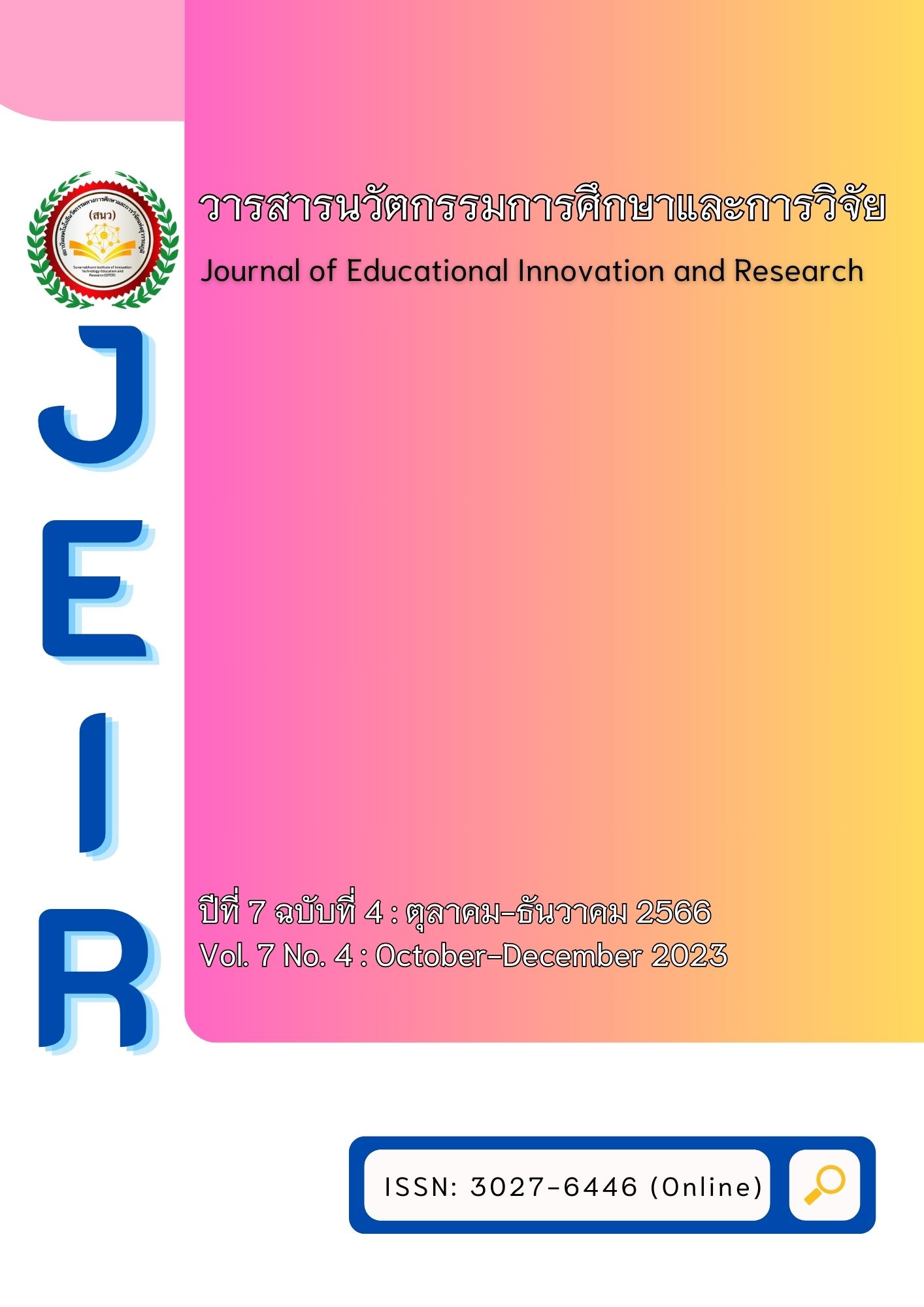Learning Management Towards the Development of Academic Achievement for Software Engineering Students, College of Computing, Prince of Songkla University, Phuket Campus
Main Article Content
Abstract
The purposes of this article were 1) to study perception levels including comprehension in the particular laws, and, the Internet and Information Technology behaviors of the 4th year Software Engineering students, College of Computing, Prince of Songkla University, Phuket Campus and 2) to compare pre-learning and post-learning achievements by using integrated experiential learning activity in the class Legal and Ethical Considerations in Information Technology (IT).The sample group consisted of 53 fourth-year software engineering students in the College of Computer Science who were enrolled in the Information Technology Law and Ethics course in the first semester of 2021. There were 3 research tools: 1) video clips, 2) academic achievement assessment forms, and
3) behavioral survey questionnaires. Data were analyzed using percentage, mean, standard deviation and t-test.
The results showed that 1) Students received more than 53% of the information regarding the promulgation of the specified law with a moderate to high level of understanding. The most behavioral trend was to verify and search the source of information obtained from the Internet, electronic transactions due to convenience, time and cost savings and fees, despite the risks. On the other hand, there was less tendency to use pirated software or goods and products. 2) Learning achievements of the students on the learning activity found that the pre-learning and post-learning mean scores were 3.79 and 6.4 respectively. The post-learning was significantly higher than pre-learning at the 0.05 level.
The knowledge from the research results could be adapted into an activity format to survey the experiential behavior of the target group using the pre-test and post-test achievement evaluation. The evaluation results obtained from the self-survey could be used as a guideline for planning self-improvement in the specified problems or goals.
Article Details

This work is licensed under a Creative Commons Attribution-NonCommercial-NoDerivatives 4.0 International License.
References
กมลชนก วงศ์สวัสดิ์ และวัลลภ รัฐฉัตรานนทร์. (2563). ความรู้ความเข้าใจต่อพระราชบัญญัติคุ้มครองข้อมูลส่วนบุคคล พ.ศ. 2562 ของพนักงานการไฟฟ้าส่วนภูมิภาค สำนักงานใหญ่. วารสารรัฐศาสตร์ปริทรรศน์ มหาวิทยาลัยเกษตรศาสตร์, 7(2), 53-67.
กิตติพศ ทูปิยะ. (2560). พฤติกรรมการใช้อินเทอร์เน็ตและสารสนเทศของนิสิตมหาวิทยาลัยบูรพา วิทยาลัยการบริหารรัฐกิจ (วิทยานิพนธ์มหาบัณฑิต). มหาวิทยาลัยบูรพา.
กันตาภา สุทธิอาจ, ไพฑูรย์ สินลารัตน์ และไสว ฟักขาว. (2561). การพัฒนารูปแบบการเรียนการสอนแบบเน้นประสบการณ์ตามสภาพจริง เพื่อส่งเสริมคุณลักษณะการเรียนด้วยการนำตนเอง ของนักเรียนชั้นมัธยมศึกษาตอนต้น. วารสารบัณฑิตศึกษา มหาวิทยาลัยราชภัฏวไลยอลงกรณ์ ในพระบรมราชูปถัมภ์, 12(3), 1-15.
เกียรติพร สินพิบูลย์. (2560). การพัฒนาความสามารถด้านการคิดอย่างมีวิจารณญาณโดยการจัดการเรียนรู้ด้วยการใช้คำถามเป็นฐานกับมัลติมีเดีย สำหรับนักเรียนชั้นมัธยมศึกษาปีที่ 6 (วิทยานิพนธ์มหาบัณฑิต). มหาวิทยาลัยศิลปากร.
จารุณี กัมพลาวลี. (18 กุมภาพันธ์ 2565). สรุปสถิติภัยคุกคามปี 2564 จากศูนย์ปฏิบัติการ CSOC ของ NT cyfence. ศูนย์ปฏิบัติการ Cyber Security Operation Center (CSOC). สืบค้นเมื่อ22 มีนาคม 2565, จาก https://www.cyfence.com/article/ntcyfence-csoc-summary-2021/
จิตรลดา เพลิดพริ้ง, อังสนา ผ่อนสุข, มงคล ณ ลำพูน, ไพฑูรย์ จันทร์เรือง, จงกลนี ลิ้มประภัสสร, กัลยานี นุ้ยฉิม, ธีระยุทธ เพลิดพริ้ง. (2562). การศึกษาความสัมพันธ์ระหว่างการรับรู้และความเข้าใจต่อการกระทำความผิดตามพระราชบัญญัติว่าด้วยการกระทำความผิดเกี่ยวกับคอมพิวเตอร์ พ.ศ.2560. วารสารวิชาการ สถาบันวิทยาการจัดการแห่งแปซิฟิค, 5(2), 378-385.
ชนัญฑิดา มูลชีพ และกัมปนาท วงษ์วัฒนพงษ์. (2564). การศึกษา ความรู้ เจตคติ และการปฏิบัติตามกฎหมายพระราชบัญญัติว่าด้วยการกระทำความผิดเกี่ยวกับคอมพิวเตอร์ พ.ศ. 2560 ของบุคลากรส่วนท้องถิ่น กรณีศึกษา องค์กรปกครองส่วนท้องถิ่นในเขอำเภอคีรีมาศ จังหวัดสุโขทัย. วารสารวิจยวิชาการ, 4(4), 39-52.
ดาวรถา วีระพันธ์. (2560). การพัฒนาบทเรียนคอมพิวเตอร์ช่วยสอน เรื่อง พระราชบัญญัติว่าด้วยการกระทำความผิดเกี่ยวกับคอมพิวเตอร์ พ.ศ. 2550. วารสารบัณฑิตศึกษา มหาวิทยาลัยราชภัฏวไลยอลงกรณ์ ในพระบรมราชูปถัมภ์, 11(1), 44-54.
ทวีศักดิ์ กออนันตกูล. (2544). ความก้าวหน้าของอินเทอร์เน็ตในประเทศไทย. สืบค้นเมื่อ 20 มิถุนายน 2565, จาก http://www.nectec.or.th/users/htk/milestones-th.html
ปริยวิศว์ ชูเชิด และ เรวดี ศักดิ์ดุลยธรรม. (2560). การรับรู้และความเข้าใจต่อการกระทำความผิดตามพระราชบัญญัติว่าด้วยการกระทำความผิดเกี่ยวกับคอมพิวเตอร์ พ.ศ. 2560 ของประชาชนในจังหวัดนนทบุรีและกรุงเทพมหานคร (รายงานผลการวิจัย). มหาวิทยาลัยราชพฤกษ์.
รังสินี พูลเพิ่ม, จันทนา โปรยเงิน, แสงจันทร์ สุนันต๊ะ และนนทิกา พรหมเป็ง. (2561). ประสิทธิผลการเรียนการสอนโดยใช้คำถามเป็นฐานของนักเรียนพยาบาล วิทยาลัยกองทัพบก. วารสารพยาบาลทหารบก, 19(3), 126-136.
วิชัย วงษ์ใหญ่ และมารุต พัฒผล. (2558). การโค้ชเพื่อการรู้คิด (Cognitive Coaching). กรุงเทพฯ: จรัลสนิทวงศ์.
วิภาวดี อวยพร. (2560). ปัจจัยที่มีอิทธิพลต่อการใช้ซอฟต์แวร์ละเมิดลิขสิทธิ์ในประเทศไทย (วิทยานิพนธ์ปริญญามหาบัณฑิต). มหาวิทยาลัยธรรมศาสตร์.
ศูนย์ประสานการรักษาความมั่นคงปลอดภัยระบบคอมพิวเตอร์ประเทศไทย. (2565). สถิติภัยคุกคาม ประจำปี พ.ศ. 2565. สืบค้นเมื่อ 20 มิถุนายน 2565, จาก https://www.etda.or.th/th/Our-Service/thaicert/stat.aspx
สำนักแผนงานและงบประมาณ. (28 ตุลาคม 2562). สถิติความผิดต่อ พ.ร.บ. ว่าด้วยการกระทำความผิดเกี่ยวกับคอมพิวเตอร์ พ.ศ. 2550. สืบค้นเมื่อ 20 มิถุนายน 2565, จาก https://oppb.coj.go.th/th/content/category/detail/id/8/cid/2101/iid/166875
สำนักพัฒนาธุรกรรมทางอิเล็กทรอนิกส์. (2564). รายงานผลสำรวจพฤติกรรมผู้ใช้อินเทอร์เน็ตในประเทศไทย ปี 2563. สืบค้นเมื่อ 4 สิงหาคม 2564, จาก https://www.etda.or.th/th/ newsevents/pr-news/ETDA-released-IUB-2020.aspx
สำนักพัฒนาธุรกรรมทางอิเล็กทรอนิกส์. (2564). รายงานผลสำรวจพฤติกรรมผู้ใช้อินเทอร์เน็ตในประเทศไทย ปี 2564. สืบค้นเมื่อ 4 สิงหาคม 2564, จาก https://www.etda.or.th/th/pr-news/ETDA-released-IUB-2021.aspx
อารีย์ ศรีสุกอง. (2562). ผลการจัดการเรียนรู้แบบประสบการณ์ ที่มีต่อผลสัมฤทธิ์ทางการเรียน เรื่อง ความน่าจะเป็น สำหรับนักเรียนชั้นมัธยมศึกษาปีที่ 3 (การค้นคว้าอิสระมหาบัณฑิต). มหาวิทยาลัยนเรศวร.
เอกพันธ์ พัฒนาวิจิตร. (2558). ปัจจัยที่ส่งผลต่อการเปิดเผยข้อมูลส่วนบุคคล กรณีศึกษาการลงชื่อเข้าใช้ด้วยรหัสผู้ใช้เฟซบุ๊ก (วิทยานิพนธ์ปริญญามหาบัณฑิต). มหาวิทยาลัยธรรมศาสตร์.
Bloom, B. S., and Krathwohl, D. R. (1956). Taxonomy of educational objectives: The classification of educational goals, by a committee of college and university examiners. Handbook I: Cognitive domain. New York: Longmans, Green.
Mumford, A. (1992). The manual of learning styles. Berkshire: Peter Honey Publications.
Kolb, D. A. (1984). Experiential Learning: Experience as the source of learning and development Englewood Cliffs. New York: Prentice-Hall.
Wilson, T.D. (1999). Models in Information Behavior Research. Journal of Documentation, 55, 249-270.


